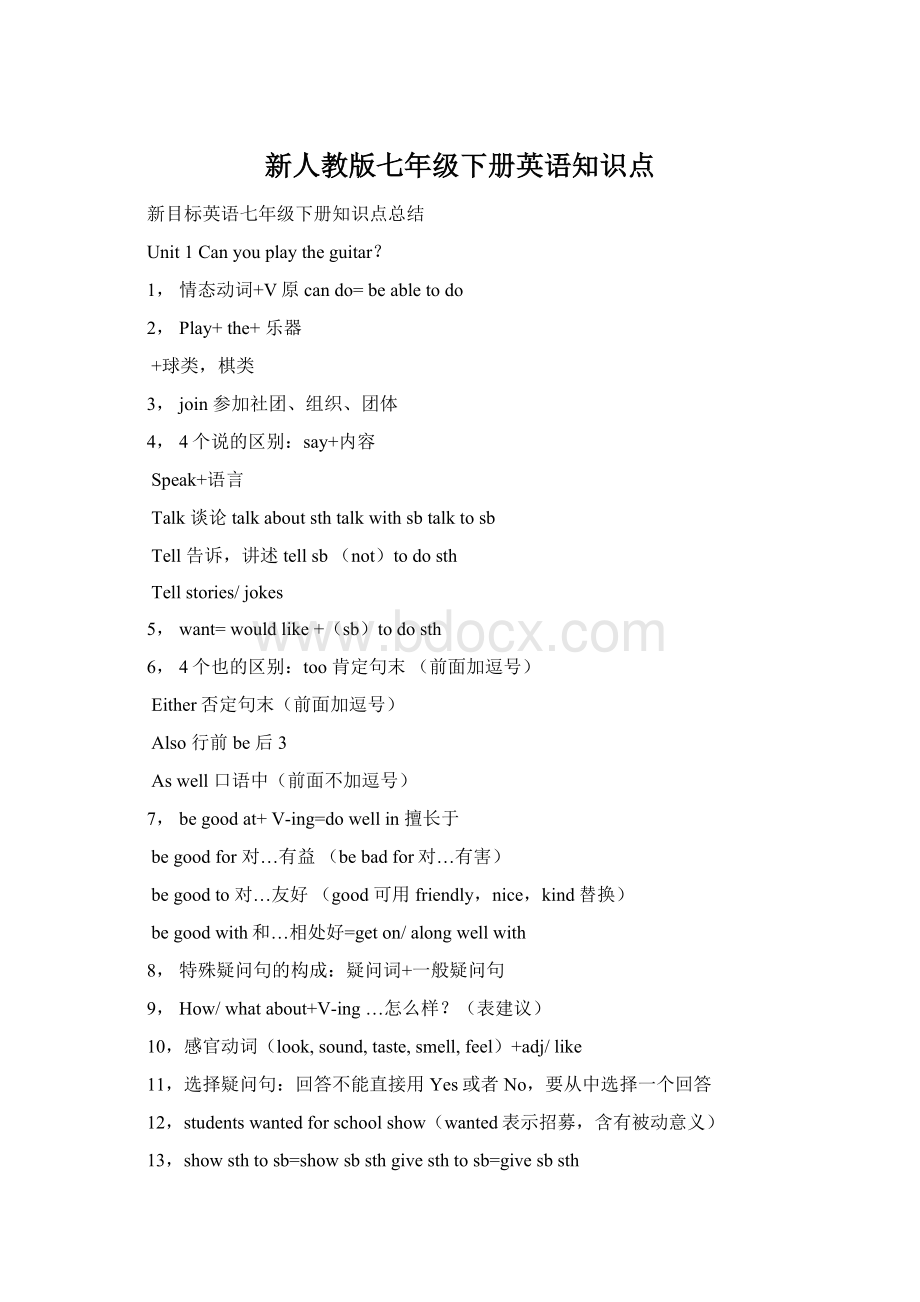新人教版七年级下册英语知识点Word格式.docx
《新人教版七年级下册英语知识点Word格式.docx》由会员分享,可在线阅读,更多相关《新人教版七年级下册英语知识点Word格式.docx(14页珍藏版)》请在冰豆网上搜索。

Helponeselfto随便享用
15,bebusydoingsth/bebusywithsth
16,needtodosth
17,befree=havetime
18,havefriends=makefriends
19,callsbat+电话号码
20,ontheweekend=onweekends
21,English-speakingstudents说英语的学生(带有连词符,有形容词性质)
22,dokungfu表演功夫
Unit2Whattimedoyougotoschool?
1,问时间用whattime或者when
At+钟点at7o’clockatnoon/atnight(during/intheday)
On+具体某天、星期、特指的一天onApril1stonSundayonacoldwintermorning
In+年、月、上午、下午、晚上
2,时间读法:
顺读法
逆读法:
分钟≤30用pastfivepasteight(8:
05)halfpasteight(8:
30)
分钟>30用toaquartertoten(9:
45)
整点用…o’clock7o’clock(7:
00)
3,3个穿的区别:
wear表状态,接服装、手套、眼镜、香水等
Puton表动作,接服装
Dress表动作,接sb/oneselfgetdressed穿衣
3,感叹句:
How+adj+主谓!
How+adj+a/an+n单+主谓!
What+a/an+adj+n单+主谓!
What+adj+n复/不可数+主谓!
4,from…to…
5,be/arrivelatefor
6,频度副词(行前be后)
Alwaysusuallyoftensometimesseldomhardlynever
7,一段时间前面要用介词forforhalfanhourforfiveminutes
8,eat/have…forbreakfast/lunch/dinner/supper
9,either…or
10,alotof=lotsof
11,itis+adj+forsb+todosth(adj修饰todosth)ItisimportantformetolearnEnglish.
itis+adj+ofsb+todosth(adj修饰sb)Itiskind/friendly/niceofyoutohelpme.
Unit3Howdoyougettoschool?
1,疑问词
How如何(方式)
howlong多长(时间)答语常用“(For/about+)时间段”
howfar多远(距离)答语常用“(It’s+)数词+miles/meters/kilometers”
howoften多久一次(频率)答语常用“Always/often/everyday/…”或“次数+时间”等表频率的状语
Howsoon多快,多久以后,常用在将来时中。
答语常用“in+时间段”
howmany多少(接可数名词)howmuch(接不可数名词)
why为什么(原因)what什么when何时
who谁whom谁(宾格)(针对宾语提问也可用who)whose谁的
2,宾语从句要用陈述句语序
3,Stopsbfromdoingsth
Stoptodo停下来去做其他事
Stopdoing停止正在做的事
4,whatdoyouthinkof/about…?
=howdoyoulike…?
你认为…怎么样?
5,Heis11yearsold.
Heisan11-year-oldboy.
6,manystudents=manyofthestudents
7,beafraidofsthbeafraidtodosthworryaboutbeworriedabout担心
8,playwithsb
9,cometrue
10,havetodosth
11,heislikeafathertome(like像)
12,leave离开leavefor出发前往某地
13,cross是动词across是介词
14,thanksfor+n/V-ing
Thanksforyourhelp/thanksforhelpingme.
Thanksforyourinvitation/thanksforinviting/askingme.
Thanksto幸亏,由于,因为
15,4个花费:
人+spend/spends/spent+时间/钱+(in)doingsth/onsth
人+pay/pays/paid+钱+forsth
Ittakes/tooksb+时间+todosth
物+cost/costs/cost+sb+钱
16,交通方式
●用介词。
在句子中做方式状语。
①by+交通工具名词(中间无需任何修饰)
Bybus/bike/car/taxi/ship/boat/plane/subway/train……
②by+交通路线的位置
Byland/water/sea/air
③in/on+冠词/物主代词/指示代词+交通工具名词
Ina/his/thecar
Ona/his/thebus/bike/ship/train/horse/motorbike
④onfoot步行
●用动词。
在句子中做谓语。
①take+a/the+交通工具名词
takeabus/plane/ship/train
rideabike
②walk/drive/ride/flyto……(后面接here,there,home等地点副词时,省略介词to。
)如步行回家:
walkhome
17,名词所有格
一般情况加’sTom’spen
以s结尾加’theteachers’officetendays’holiday
表示几个人共同拥有,在最后一个名词后加’sMikeandJohn’sdesk
表示每个人各自拥有,在每个名词后加’sMike’sandJohn’sdesks
Unit4Don’teatinclass.
1,祈使句(变否定在句首+don’t)
Be型(be+表语),否定形式:
don’t+be+表语Bequiet,please.Don’tbelate!
Do型(实义动词+其他),否定形式:
don’t+实义动词+其他
Comehere,please.Don’tplayfootballhere.
Let型(letsbdosth),否定形式:
don’t+letsbdosth或者letsbnotdosth
No+n/V-ingNophotos/mobile;
Noparking/smoking/spitting/talking/pickingofflowers
2,inclass在课堂上intheclassroom在教室
3,beontime准时
4,listentomusic
5,(havea)fightwithsb
7,eatoutside
8,Must与haveto
(1)must表示说话人主观上的看法,意为“必须”。
haveto表示客观的需要或责任,意为“不得不,必须”,后接动词原词。
(2)must没有人称,时态和数的变化Haveto有人称,数,时态的变化,其第三人称单数形式为hasto,过去式为hadto.构成否定句或疑问句时借助动词do/does。
(3)haveto的否定式是needn’t=don’t/doesn’thaveto(不必要);
must的否定式是mustnot/mustn’t(一定不能,不允许)。
9,Someof…
10,bring…to…
11,practice(doing)sth
12,wash/dothedishes
13,onschooldays/nights
14,break/follow(obey)therules
15,Bestrictwithsb/oneselfbestrictinsth对……严格。
16,toomany“太多”修饰可数名词复数
toomuch“太多”修饰不可数名词
muchtoo“实在太”修饰形容词或副词
17,makeone’s/thebed
18,getto,arrivein/at,reach,到达(如果后面接地点的副词home,here或there,就不用介词in,at,to)
19,remember/forget+todo要做
+doing做过
20,havefun,enjoyoneself,haveagood/great/wonderfultime+V-ing
Unit5Whydoyoulikepandas?
1,回答why的提问要用because
2,Kindof相当于副词,修饰形容词或副词,意为“稍微,有点”,与alittle/bit相近
Akindof意为“一种”,somekindsof意为“几种”,allkindsof意为“各种各样的”。
这里的kind是“种,类,属”的意思。
3,Whynot=Whydon’tyou+V原你为什么不…?
4,walkonone’slegs/handson意为“用…方式行走”
5,allday=thewholeday整天
6,来自be/comefromwheredotheycomefrom?
=wherearetheyfrom?
7,morethan=over超过lessthan少于
8,oncetwicethreetimes
9,beingreatdanger
10,oneof……之一+名词复数
11,getlost
12,with/without有/没有介词
13,asymbolof
14,由…制造bemadeof能看出原材料
bemadefrom看不出原材料
bemadein+地点表产地
15,cutdown砍到动副结构(代词必须放中间,名词可放中间或者后面)
Unit6I’mwatchingTV.
1,现在进行时
其结构为be的现在式(am,is,are)+现在分词(V-ing)。
否定形式在be后面加not,疑问式将be动词提前
2,动词-ing形式的构成:
一般情况+ing;
以不发音的e结尾的,去e加ing;
重读闭音节结尾,末尾只有一个辅音字母,双写辅音字母再加ing
3,gotothemovies
4,joinsbforsth与某人一起做某事joinusfordinner
5,livewithsblivein+地点
6,other,another与theother
Other“其他的,另外的”,后接名词复数,有时other+n复数=others
Another“又一(个),另一(个)”,泛指总数为三个或三个以上中的任意一个,后接名词单数。
Theother“(两者中的)另一个”,常与one连用,“one…theother…”表示“一个…,另一个…”
7,talkonthephone
8,wishtodosth
9,Hereis+n单Hereare+n复
Unit7It’sraining!
1.询问天气的表达方式:
How’stheweather?
It’saraining/sunnyday.It’sraining.
What’stheweatherlike?
It’swindy.
2,playcomputergames
3,How’sit/everythinggoing?
=Howhaveyoubeen?
4,In/atthepark
5,Takeamessageforsb替人留言
Leaveamessagetosb给人留言
6,callsbback
7,rightnow,rightaway,atonce,inaminute,inamoment,innotime立刻,马上
8,rightnow现在justnow刚刚(用于一般过去式)
9,overandoveragain
10,theanswertothequestion,akeytothedoor,atickettotheballgame
11,bythepool
12,summervacation
13,goonavacation去度假beonavacation在度假
14,write(aletter)tosb
15,反意疑问句(陈述句+附加疑问句)
反意疑问句中,陈述句用的肯定,后面的附加疑问句就要用否定;
相反,陈述句用的否定,附加疑问句就要用肯定。
16,adj以-ing结尾“令人…的”exciting,interesting,relaxing
以-ed结尾“人感到…的”excited,interested,relaxed
17,inthefirstpicture
18,dry干燥的humid潮湿的
Unit8Isthereapostofficenearhere?
1,Thereis+单数可数名词/不可数名词+地点状语.
Thereare+复数名词+地点状语.
谓语动词要与跟它最近的那个名词一致(就近原则)。
Therebe句型的否定式在be后加上not或no即可。
注意not和no的不同:
not是副词,no为形容词,nota/an/any+n.相当于no+n.
Therebe句型的一般疑问句变化是把be动词调整到句首
Therebe表示“某处存在某物或某人”;
have表示“某人拥有某物/某人”
2,问路:
①Is/Arethere……nearhere/aroundhere/intheneighborhood?
②Whereis/are……?
③HowcanIgetto……?
④Could/Canyoutellmethewayto……
⑤Whichisthewayto……
3,Across,cross,through,over
Across是介词,“横过,在对面”表示从物体表面穿过
Cross是动词,相当于go/walkacross
Through是介词,表示从物体中间或里面穿过gothroughthedoor
Over是介词,“横过,越过”表示从物体上空越过,跨过flyover
4,askforhelp/advice
5,in/onthestreet
6,在某条大街上习惯用介词ononBridgeStreet
7,acrossfrom,nextto,between…and…,behind
8,infrontof在…(外部的)前面→behind在…后面inthefrontof在…(内部的)前面
9,beintown→beoutoftown
10,befarfrom
11,go/walkalonggostraightgoup/down
12,turnleft/right
13,onone’s/theleft
14,atthefirstcrossing/turning
15,sometimes有时(频度副词)sometime(将来)有朝一日,(曾经)某天
Sometimes几次,几倍sometime一段时间(前面用介词for)
16,free空闲的freetime
自由的asfreeasafish
免费的Thebestthingsinlifearefree.
17,enjoydoing
18,Timegoesquickly.
19,表“一些”在肯定句中用some.在疑问句和否定句中用any。
特殊用法:
some可用于表示盼望得到对方肯定的答复或表示建议、委婉请求的疑问句中。
any也可用于肯定句中,表示"
任何的"
。
Unit9Whatdoeshelooklike?
1,whatdoeshelooklike?
询问人长什么样,回答:
①主语+be+形容词/介词短语(heistall/ofmediumheight);
②主语+have/has+形容词+名词(shehaslonghair)
whatdoessblike?
询问某人喜欢什么
2,多个形容词修饰名词
多个形容词修饰名词,一般关系近的靠近名词;
音节少的在前,音节多的在后。
限定词+数词(序前基后)+描绘性形容词+大小、长短、高低+新旧+颜色+国籍+材料+名词
3,Maybe为情态动词+动词原形,在句子中做谓语,maybe是副词,表示可能,大概,一般放在句首。
4,alittle,little修饰不可数名词,alittle表示一点点,little表示几乎没有
afew,few修饰可数名词,afew表示一点点,few表示几乎没有
5,Find强调找到的结果,lookfor强调寻找的过程.
6,问职业:
whatdoyoudo?
=whatisyourjob?
7,thesameas→bedifferent
8,longstraightbrownhair
9,最后intheend(表事情结局)finally(强调次序)atlast(强调经多番努力终于达成)
Bytheendof直到……为止
Attheendof在……末端/尽头
Unit10I’dlikesomenoodles.
1,名词可分为可数名词和不可数名词(不可数名词作主语,谓语动词用单数)。
可数名词又分单数和复数。
一般+s;
以-s,-x,-ch,sh结尾的名词+es;
辅音+y,把y变i,再+es;
以-o结尾的,有生命的+es(negro—negroes;
hero—heroes;
tomato—tomatoes;
potato—potatoes);
无生命的+s;
⑤以f,fe结尾的名词,改f,fe为v+es(leaf—leaves;
knife—knives)(例外:
roofs,chiefs)⑥单复数同形:
sheep,deer.不规则变化:
man—men;
woman—women;
child—children;
foot—feet;
tooth—teeth等
2,wouldlikesth.想要某物
Wouldyoulikesome…?
你想要一些……吗?
——Yes,please./——No,thanks.
wouldliketodosth.“想要做某事”。
Wouldyouliketo…?
你愿意去做……吗?
—Yes,I’dlike/loveto./—I’dlike/loveto.ButI’mtoobusy.
wouldlikesbtodosth“想要某人做某事”。
3,order:
orderfoodtake/haveone’sorder
Inorderto为了
Intheorder按顺序
Order/bookaroom预定房间
Ordersb(not)todosth命令
4,special和especial
Special特别的人或事物,特别的,特殊的,specials特色菜;
specially专门地,特地
Especial特别的,突出的,especially特别,尤其
5,thenumberof表示“……的数量”,后面接可数名词复数。
做主语时,主语是number而不是of后面的名词复数,因此谓语动词要用单数;
anumberof表示“许多”,相当于many,后面接可数名词复数,做主语时,主语不是number而是of后面的名词复数,因此谓语动词要用复数。
Number前可用